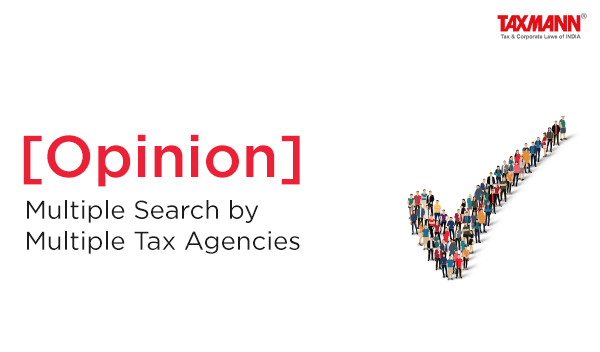[Opinion] Multiple Search by Multiple Tax Agencies
- Blog|News|GST & Customs|
- 2 Min Read
- By Taxmann
- |
- Last Updated on 18 October, 2023

Mahi Yadav – [2023] 155 taxmann.com 288 (Article)
Overview
In the dynamic landscape of financial governance, a notable phenomenon has emerged—the coordinated efforts of multiple tax agencies including Commercial Tax Department, Income Tax, Central GST, Customs Department, DGGI, DRI Enforcement Directorate, State GST authority etc. but under the umbrella of The Ministry of Finance, conducting simultaneous searches.
This can be result in what is commonly referred to as “parallel investigations”, where multiple authorities simultaneously or sequentially investigate of the same company/firm/taxpayer/business or individual. These agencies, often distinct in their jurisdiction and focus, come together to address suspicions of undisclosed income, manipulation of financial records, or involvement in complex transactions. Additionally, cross-border transactions, money laundering, or the use of tax havens may also trigger the involvement of multiple tax agencies. Such operations involve the meticulous examination of multiple locations linked to individuals, businesses, or entities under investigation.
The primary objective behind these joint search operations is to create a more comprehensive and effective approach to tackling complex financial schemes. By combining the expertise and resources of different tax agencies, authorities can cast a wider net and delve deeper into intricate financial networks that may span across various jurisdictions.
These searches are often conducted simultaneously at multiple locations linked to individuals, businesses, or entities under investigation. The synchronized nature of these operations is intended to prevent any forewarning or attempts to manipulate evidence, ensuring a thorough and unbiased examination.
One of the significant advantages of this collaborative approach is its ability to uncover hidden assets, undisclosed income, and interconnected financial transactions. It allows tax authorities to piece together a more accurate picture of an entity’s financial activities, facilitating a more precise determination of tax liabilities.
However, such concerted efforts also raise important considerations. Balancing the need for enforcement with respect for individual rights and privacy is a critical aspect of these operations. Striking this balance is crucial to maintain public trust and uphold the principles of a just and equitable tax system.
The success of these multiple-agency searches relies on seamless communication and information-sharing mechanisms between the involved entities. Although recently the Hon’ble Delhi High Court in Ashish Bhalla v. State, has ruled that when the Serious Fraud Inquiry Office (SFIO) conducts an investigation into a company’s operations under the Companies Act, it is not allowed for any other agency to conduct a simultaneous investigation.
Click Here To Read The Full Article
Disclaimer: The content/information published on the website is only for general information of the user and shall not be construed as legal advice. While the Taxmann has exercised reasonable efforts to ensure the veracity of information/content published, Taxmann shall be under no liability in any manner whatsoever for incorrect information, if any.

Taxmann Publications has a dedicated in-house Research & Editorial Team. This team consists of a team of Chartered Accountants, Company Secretaries, and Lawyers. This team works under the guidance and supervision of editor-in-chief Mr Rakesh Bhargava.
The Research and Editorial Team is responsible for developing reliable and accurate content for the readers. The team follows the six-sigma approach to achieve the benchmark of zero error in its publications and research platforms. The team ensures that the following publication guidelines are thoroughly followed while developing the content:
- The statutory material is obtained only from the authorized and reliable sources
- All the latest developments in the judicial and legislative fields are covered
- Prepare the analytical write-ups on current, controversial, and important issues to help the readers to understand the concept and its implications
- Every content published by Taxmann is complete, accurate and lucid
- All evidence-based statements are supported with proper reference to Section, Circular No., Notification No. or citations
- The golden rules of grammar, style and consistency are thoroughly followed
- Font and size that’s easy to read and remain consistent across all imprint and digital publications are applied



 CA | CS | CMA
CA | CS | CMA
